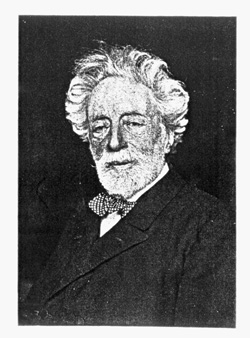1931
Dickens's dramatics
|

|
| Francesco Berger (1834-1933) was a musician and musical
director. He wrote the incidental music for Collins’s two plays The
Lighthouse and The Frozen Deep. Familiarly hagiographic about
Dickens, this reminiscence contains just a few mentions of Collins but some
details about performances of the plays. The accounts may not be completely
reliable. |
He [Dickens] invited me to associate with him in a play called "The
Lighthouse," written by Wilkie Collins, by composing its overture and incidental
music. He produced it in the theatre he had had constructed in the back-garden
of his house, one of a block of three, standing a little off Tavistock Square,
and acted in it with members of his family and a few intimate friends. Stanfield
painted the scenery, Forster recited the prologue, Wills was prompter, and I
presided at the piano with a quartet of orchestra. It was afterwards repeated at
Campden House, the Kensington mansion of Colonel Waugh.
A year later it was followed by "The Frozen Deep," written by the same hand
and acted by the same company, for which I composed fresh music. Like its
predecessor it proved an immense success, and " Society " spoke of nothing else
for weeks. Queen Victoria having expressed her wish to witness it, a strictly
private performance was given at "The Gallery of Illustration " in Regent
Street, which she attended accompanied by the Prince Consort, the King of the
Belgians, and the Court. Her Majesty was so delighted that she wished to thank
"the manager" personally for the pleasure he had given; so, at the conclusion of
the play, she tarried in her place while Dickens exchanged the ragged costume
of: the final scene for evening-dress. Even in those early democratic days a
reigning monarch paid that sort of compliment to genius such as his.
Soon after this, Dickens organised a series of public entertainments in
remembrance of his recently deceased friend Douglas Jerrold. One was the
performance of "The Frozen Deep" in the Free Trade Hall at Manchester, by
practically the same company. It was during our journey to that city that our
train was much delayed. I was travelling in the compartment adjoining that of
Dickens, and we all grew desperately hungry. To beguile the time we composed
conundrums, scribbled them on scrolls of paper, and passed them from window to
window on sticks and umbrellas. From him came the question: "Why is the
manager’s stomach at this moment like a butler’s pantry?" And while we were
puzzling for the solution, we received his: "Because there is a sink in
(sinking) there."
The Manchester audience that crowded the building endorsed to the full the
verdict of London, and two more performances had to be conceded. We all had a
glorious time in Cottonopolis… [pp15-16]
…
Dickens had a keen appreciation of the good things of the table. His own was
always lavishly supplied for his friends, and the very numerous rehearsals which
preceded the plays he produced at his house were always followed by substantial
suppers, which all concerned partook of, seated round the large table in his
commodious dining room. The viands would have delighted the heart of John
Browdie, for they included a huge joint of cold roast beef, a tongue, a ham,
several cold roast fowls, a few raised pies, trifle, tarts and jellies, dozens
of bottled Guinness and Bass, and ended with punch brewed by "the manager’s" own
hands. Punch, in those days, meant a deliciously odoured compound of rum and
brandy, spice, sugar and lemon juice, ladled, piping hot, into good-sized
tumblers from a bowl the size of a small bath. [pp17-18]
…
When I once spent a week with him and his family in Boulogne, I had occasion
to notice him in the role of devoted parent. One evening, when he, Wilkie
Collins and I visited a fair then in progress in that quaint old town, he
carried his youngest boy on his shoulders from show to show, that he might see
the fun as well as his elders. And how keenly he sympathised with neglected,
ill-used, misunderstood boys, readers of his books do not need to be reminded.
[p19-20]
From 97 by Francesco Berger, London 1931.
go back to biographies list
go back to Wilkie Collins front page
visit the Paul Lewis front page
All material on these pages is © Paul Lewis 1997-2006
